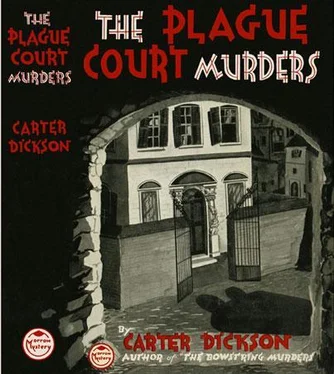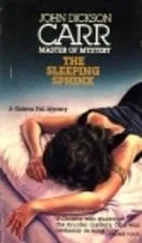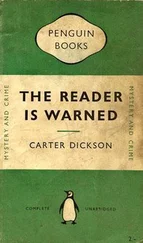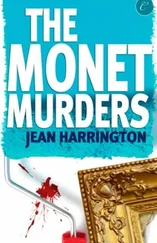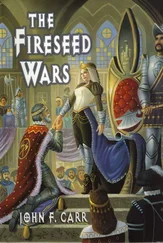"After," I said, "the confederate walking thirty yards of mud from the big house without leaving a footprint.. "
"Don't mix me up, now," growled Masters, making a fierce gesture as though he were balancing a pail of water on his head, "I said I could understand how Darworth let him in----"
"Steady on," interposed H.M. "Remember that there was a padlock on that door that had to be opened from outside. By the way, who had the key to that padlock?"
"Ted Latimer," said Masters.
There was a silence.
"Now, now," urged H.M. soothingly. "Might have been. But I shouldn't jump to conclusions - yet. That reminds me, you said something about his doing a bunk; and you haven't explained it yet. Oh, I want to hear a lot of things yet. Yet, yet, yet. . . ."
Masters squinted up his eyes. "If we could explain how the murderer went in and out of that house without leaving footprints-"
"I read a story once," volunteered H.M., like an urchin from the back of a classroom. "It was funnier than watchin' somebody sit on a silk hat. Feller committed a murder in a house with six inches of unmarked snow all around. How'd he get in and out? It appears he walked to and from the place on stilts. The police thought they was rabbit-tracks. Ha ha ha. Burn me, Masters, wouldn't it have given you a turn if you'd seen somebody staggerin' out of that place on stilts? Reasonable. Bah.
"Y'see, fatheads, the fundamental trouble with the locked-room situation is that it generally ain't reasonable. I don't mean that it can't be worked, any more than you'd deny one of Houdini's escapes; oh, far from it. I mean that, under ordinary circumstances, no real murderer would think of indulging in all the elaborate hocus-pocus we're required to believe at the end of the story.... Unfortunately, this case is different. We're up against Darworth: a man whose whole mind was devoted to hocus-pocus, and who was admittedly staging an unreasonable show for a very reasonable purpose. It becomes logical - devilish - logical, Masters. He didn't intend to be murdered; the murderer simply took advantage of a plan all worked out for him ... but, burn me, how?"
"That's what I was trying to say," retorted Masters. "If we could explain no footprints, we might explain the bolted and barred door."
H.M. looked at him.
"Don't gibber, Masters," he said austerely. "I detest gibbering. That's like saying that, after all, if you can only hang the roof of a house in the air first, there won't be any difficulty about putting up the walls. But go on. I want to see the fountains play and the star-shine of your brow... How do you explain it?"
The Inspector remained stolid. But he said: “It only occurred to me, sir - sittin' and thinkin' - that, after the murderer had gone, Darworth himself might have bolted and barred the door after him. That might have been their scheme, when Darworth only expected to be wounded. He mightn't have realized that he was really dying, and wanted the plan to go through as arranged."
"Man," H.M. replied, putting his head in his hands again, "I'll say nothin' of the fact he couldn't have moved three steps after the murderer stabbed him in earnest; that all he could do was grope for the bell-wire and then tumble down and smash the glasses in his eyes. I'll say nothin' of the fact that there was no blood-trail or marks from him to the door-as there must have been. We won't argue whether a man stabbed through the heart could have lifted a heavy iron bar and shot a bolt that it takes a strong man to move in the first place. All I'll say is, we've got to look for another explanation....”
"Facts! I want more facts, Masters. Now, about what you've been doing today, and about young Latimer. Let's have it all. Talk!"
"Yes, sir. I'll get it in order. Order's what we want. And it's getting late After I'd talked to Stiller, the solicitor, we both went round to have a look at Darworth's house. It's funny how houses have a habit of drawing people back. We'd no sooner got inside, than we met - "
Again sharply, almost in H.M.'s ear as he bent forward with a curious expression on his face, the telephone rang.
XV
A SHRINE OF GHOSTS
WITH the receiver at his ear, H.M. glared.
"No!" he said quickly "No! Wrong number! ... How do I know what number you want? My good man,. I don't give a gore-stained farthing of immoral habits what number you want.... No, this is not Whitehall 0007! This is Museum 7000. The Russell Square Zoo, you fathead.... Certainly there's a zoo in Russell Square. Look here... ." (A girl's voice, from the switchboard downstairs, cut in audibly). -"Hang it, Lollypop," said H.M. to the new voice, "why can't you shut off these blighters and not put 'em through to me...?" His voice became freezingly austere. "No, my good man, I did not call you 'Lollypop'.”
"I expect it's for me, sir," said Masters, rising hurriedly. "Excuse me. I left orders for calls for me to be transferred here. I hope you didn't -"
H.M. left off glaring at the telephone to look at him. The telephone tinkled, "Ha ha." It was still making derisive remarks when Masters dexterously got it out of H.M.'s hands.
"That was not," Masters said to it, 'a secretary being funny. That was Sir Henry Merrivale." The voice died in a gurgle. "I can't help what you thought. Get on with it, Banks! What do you want? ... Oh! ... When? ... In a cab, eh? Did you see who the other person was? ... Get the number of the cab?. Well, for reference. No, it probably isn't important. Nothing suspicious? ... No; I should just keep a sharp eye out. Get into the grounds, if it won't hurt your conscience.... Right...."
He seemed uncertain and rather disturbed as he rang off, and his hand almost went back to it. But he was distracted by all the other matters weighing on him; and H.M. was in a mood to lecture.
"There now!" said H.M., in a tone of gloomy satisfaction. He pointed at Masters. "There's a first-class example of the intolerable outrages that are perpetrated on me. And they call me `eccentric'! Imagine it! People simply. walk into my room when they like, or ring me up, and they call me eccentric! ... Pour me out another drink, Ken. I've tried every way of keepin' people out. I tried puttin' the most complicated Yale lock on my door. And the only person I ever locked out was myself, and Carstairs had to break down the door, and I still got a dark suspicion that somebody deliberately pinched that key out of my pocket. Bah.' And even my secretary, even little Lollypop, mind you; as nice a girl as ever mussed up my desk; she betrays me. I ask you, what's a man goin' to do?"
Masters, who had his hands crooked as though on the steering-wheel of a wildly skidding car, was trying to divert him. There was one way of doing it, not strictly fair. Thinking of Lollypop, I began to reminisce as though sentimental about old times. I began telling him of the day when Bunky Knapp and I had walked up unannounced, when Lollypop was with him and he was supposed to be dictating letters to her.... It was effective. He turned on Masters.
"If I'm not goin' to get any help from you, man, we might as well call this thing off. Go on! You were telling me about visiting Darworth's house. Get on with it."
He paused, peering up. Major Featherton had risen. The major had put on his top-hat with a sort of angry precision. I could only faintly see his face in the gloom round the desk-lamp; but apparently the major had groped his way through all the intricacies of which we had been talking, and he had now adjusted his thoughts to voice a coldly furious conclusion.
"Merrivale!" he said.
"Eh? Oh! Sit down, my boy, sit down.... What's the matter?"
"I came to you, Merrivale," boomed the major, with precise enunciation, "for help. By Gad, I did! And I thought you'd help us. And did you? You did not. You persist in this insufferable tommyrot about one of as - ?'
Читать дальше
